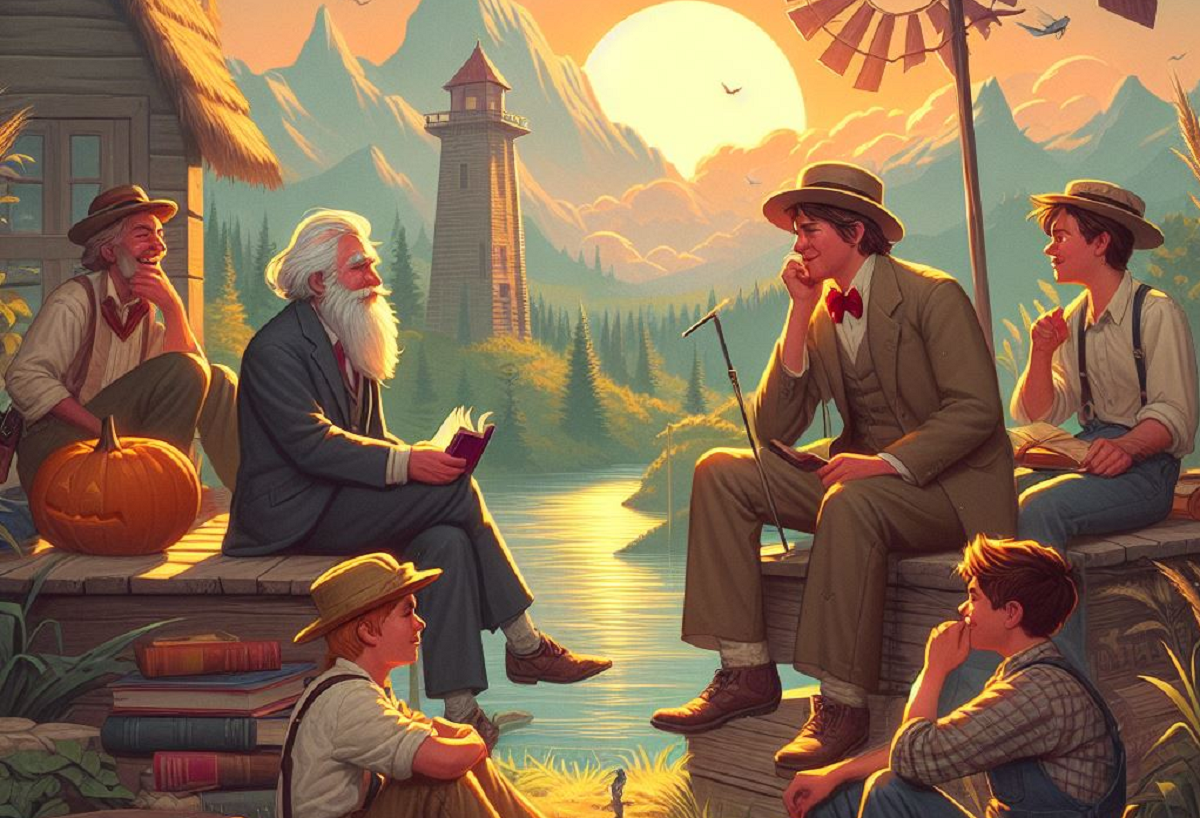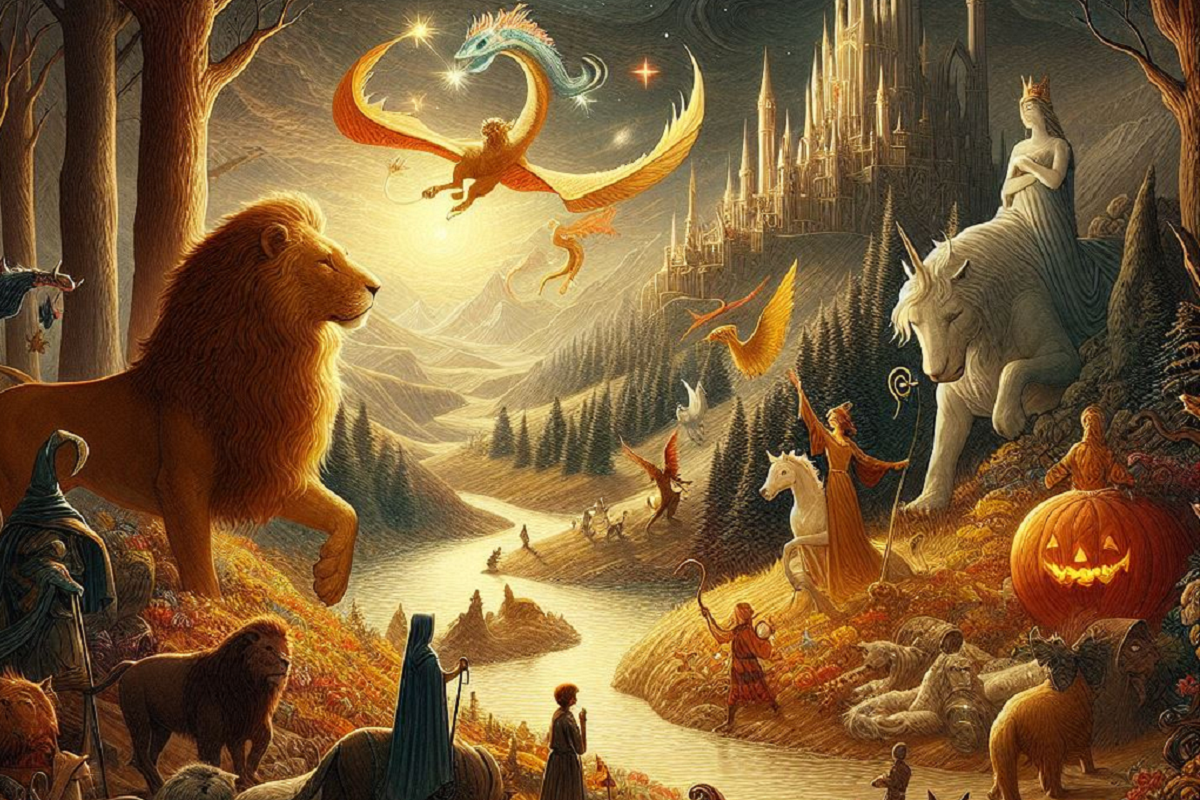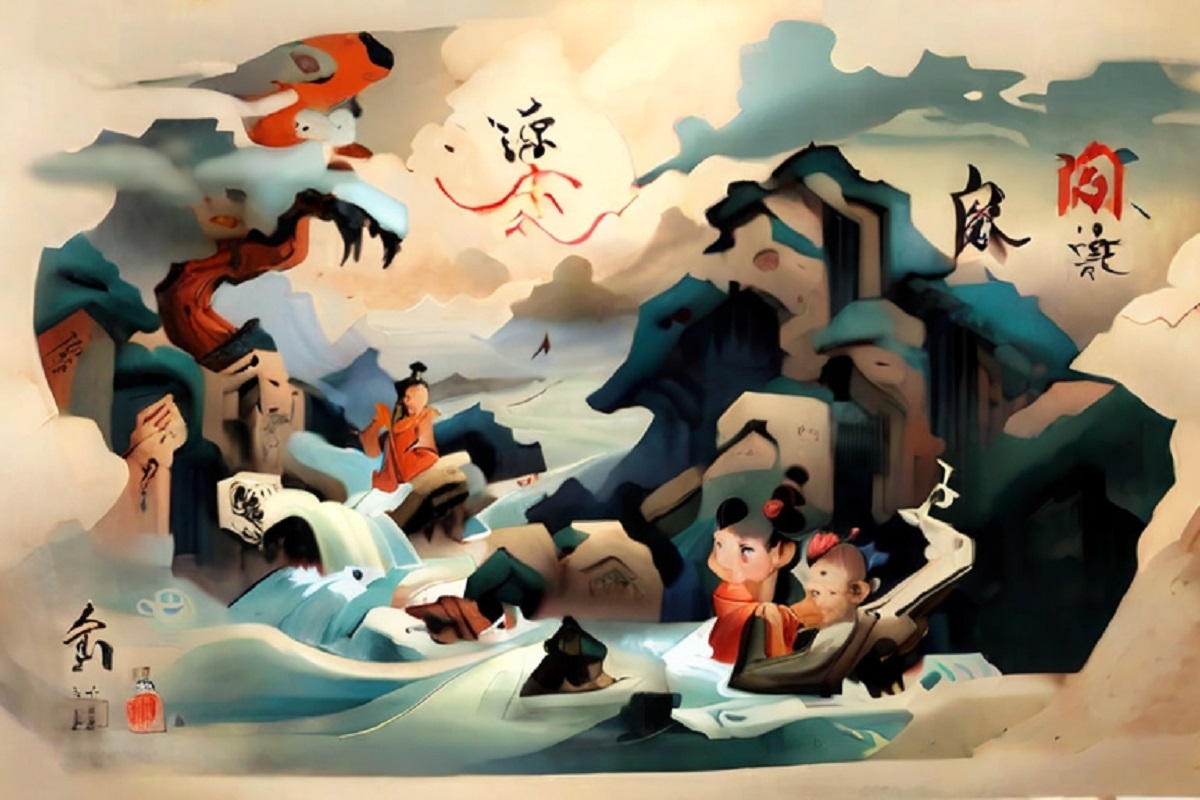The Adventures of Huckleberry Finn by Mark Twain stands as a timeless American classic that delves into the themes of freedom, morality, and the intricacies of human nature. This captivating novel is set in the antebellum South and follows the remarkable journey of a young boy named Huck Finn. As you read further, gain valuable insights into a compelling summary, in-depth character analysis, and thought-provoking themes explored in The Adventures of Huckleberry Finn.

The Adventures of Huckleberry Finn Summary
The novel opens with Huck Finn recounting the events of The Adventures of Tom Sawyer. He introduces himself as a young boy who unexpectedly inherits a considerable sum of money. However, his newfound life is under the guardianship of the Widow Douglas and her sister, Miss Watson. He feels suffocating, leaving him yearning for excitement and liberation.
The reappearance of his abusive father, Pap, further complicates matters as he demands Huck’s fortune. He planned to escape both his father’s torment and societal constraints. So, Huck devises a plan to fake his own demise and seeks refuge on Jackson Island in the Mississippi River.
On the island, Huck comes across Jim, an escaped slave belonging to Miss Watson. Both seeking freedom, Jim discovers he is destined for sale and separation from his loved ones downriver. United in purpose, they embark on a journey down the river on a hastily crafted raft. Along the way, they encounter various vibrant characters and situations that add color to their adventure.
In one of Huck’s initial encounters, he becomes acquainted with the wealthy and aristocratic Grangerford family. However, their involvement in an inexplicable feud with the Shepherdsons brings about tragic consequences. Huck witnesses this firsthand as he forms a bond with Buck, a member of the Grangerford clan. He witnesses his demise amidst the violent conflict between these two families.
Huck and Jim’s journey continues as they encounter two cunning con artists, the Duke and the Dauphin. Professing to be a duke and a king, these scammers deceive innocent townsfolk to line their pockets. They were reluctantly entangled in their deceitful machinations. Huck and Jim find themselves grappling with moral quandaries. They manage to escape from the fraudsters’ clutches and resume their eventful expedition.
The narrative takes a darker turn when Huck and Jim stumble upon a wrecked steamboat. They come across a gang of robbers on board. During their encounter with the criminals, Jim gets captured while Huck is compelled to go ashore in search of help. He finds himself seeking refuge in the home of the Grangerfords’ adversaries, the Shepherdsons. He narrowly escapes yet another perilous conflict.
Huck reunites with Jim, their journey continuing together. As they travel, Huck’s internal struggle grows stronger as he grapples with the decision to aid Jim. He composes a letter to Miss Watson, intending to reveal Jim’s location. But ultimately tears it apart, he opts to stand by his loyal friend.
The climax of the novel occurs when Huck and his best friend Tom Sawyer come up with a plan to set Jim free from captivity. Tom’s overly intricate scheme, fueled by his love for adventure stories. He sets off a chain of both humorous and dangerous adventures. Ultimately, Jim is liberated; however, he endures unnecessary suffering due to Tom’s mischievous antics.
The novel concludes as Huck makes the decision to venture out on his own once again. He feels uneasy about the constraints of society and deeply yearns for the liberating sensation of the open road. Although uncertain about what lies ahead, he is resolute in his determination to explore uncharted territories.
Dada! We are done with the summary of The Adventures of Huckleberry Finn by Mark Twain. Keep reading to get insights into characters, themes, and quotes from this book.
Characters in The Adventures of Huckleberry Finn
The Adventures of Huckleberry Finn by Mark Twain showcases a wide array of characters who play pivotal roles in developing the novel’s themes and advancing its plot. Let’s explore some key individuals within this literary journey:
1. Huckleberry Finn (Huck): Huck is a young boy who has been raised in a society that has instilled in him the values of racism and conformity. As he escapes from his father and joins Jim on the raft, he begins to question these values and his own conscience. Huck’s internal struggle is central to the novel. He grapples with the conflicting forces of his upbringing and his own sense of right and wrong.
2. Jim: Jim, an escaped slave, becomes Huck’s trusted companion on their shared raft journey. He assumes the role of a paternal figure for Huck and embodies the values of human dignity and resilience. Jim’s relentless pursuit of freedom for himself and his loved ones serves as a driving force behind the events in the novel.
3. Pap Finn: Huck’s father, Pap, embodies the dark side of society with his abusive and alcoholic behavior. He is characterized by racism, violence, and manipulation. Most importantly, his mistreatment of Huck becomes a pivotal factor in Huck’s decision to escape from him. Comparatively, Pap serves as a contrasting figure to Jim, illuminating the stark differences between these two father figures in Huck’s life.
4. Tom Sawyer: Huck’s closest companion, Tom, embodies both mischief and imagination. He has a tendency to involve Huck in trouble through his adventurous nature. Although Tom’s presence diminishes towards the end of the novel, his impact on Huck’s decision-making process remains significant. This is particularly evident as Huck confronts the conflict between Tom’s idealized perception of escapades and the harsh realities encountered during their river journey.
5. Widow Douglas: Widow Douglas is a compassionate and nurturing woman. She graciously welcomes Huck into her home to introduce him to society’s refined ways. Her actions exemplify the well-intentioned yet somewhat patronizing endeavors of society to reshape Huck.
6. Miss Watson: Miss Watson, the sister of Widow Douglas, takes on the task of educating and reforming Huck. Despite her stern demeanor, she often finds herself at odds with Huck’s independent nature.
7. The Duke and the Dauphin: Huck and Jim come across two con artists during their journey. These individuals claim to be a duke and a dauphin, the heir to the French throne. Together, they engage in various fraudulent activities and plots.
8. Judge Thatcher: He is a well-respected member of the town. He is responsible for overseeing Huck’s finances and providing him protection from his father.
9. Aunt Polly: Tom Sawyer’s aunt and guardian, Aunt Polly, is a compassionate and benevolent woman who assumes a minor yet crucial role in the narrative.
10. The Grangerfords and the Shepherdsons: During his travels along the river, Huck encounters two feuding families. This ongoing conflict between them serves as a reflection of the senseless violence and hypocrisy prevalent in society.
These characters appear in the summary of The Adventures of Huckleberry Finn above which play important roles in developing the novel’s themes.
Recommended: Modernism in Literature | Characteristics and Examples
What is The Adventures of Huckleberry Finn about?
After reading the summary, let us look into The Adventures of Huckleberry Finn themes. This book delves into various significant themes that tackle the societal and moral concerns of its era.
1. Freedom: The novel delves into the diverse manifestations of freedom. Jim longs to break free from the clutches of slavery. While Huck yearns for liberation from oppressive societal norms that confine him. The Mississippi River itself takes on the role of a powerful symbol. It represents both freedom and the potential for escape.
2. Morality and Conscience: Huck finds himself caught between the moral teachings of society and his own growing understanding of what is right and wrong. As he chooses to assist Jim, despite it going against societal norms, we witness his increasing awareness of morality unfolding.
3. Race and Racism: Huck takes on the racism prevalent in the pre-Civil War South. It sheds light on the inhumane impact of slavery and challenges the discriminatory mindsets of that era. Through the character of Jim, Mark Twain skillfully exposes how slavery devalues individuals. Also, it prompts readers to reconsider their own prejudiced beliefs.
4. Social Satire: Twain skillfully employs satire to scrutinize various facets of society. He targets the hypocrisy prevalent in religious and moral institutions. It exposes the gullibility of the townspeople and highlights the absurdity inherent in romanticized adventure stories.
5. Individual vs. Society: Huck’s journey epitomizes his struggle to assert his individuality amidst the pressures of societal conformity. Embedded within his character development is the pivotal choice to embrace his own moral compass over society’s expectations.
6. Friendship: The theme of friendship between Huck and Jim holds great significance in the narrative. Their profound bond challenges the prevailing norms of their time. Their unwavering loyalty to each other serves as a driving force behind many pivotal moments in the story.
7. Nature and the River: The natural world symbolizes freedom and serves as the backdrop for many events in the novel. It represents an escape from society and a return to a more honest and primal existence.
8. Childhood and Coming of Age: Huck Finn’s perspective grants readers the opportunity to perceive the adult world with renewed clarity. His journey down the river serves as a significant rite of passage. It signifies his transition from childhood to a more intricate comprehension of life.
9. Identity and Disguise: Characters in the novel assume false identities and partake in acts of deception. They spark contemplation on the ever-changing nature of identity and the facades individuals don in society.
These themes are evident from the summary of The Adventures of Huckleberry Finn given above. Keep reading to find a few important quotes from this novel.
Quotes in The Adventures of Huckleberry Finn
The Adventures of Huckleberry Finn by Mark Twain encompasses humor, social commentary, and the essence of Huck. Explore below a compilation of noteworthy quotes from this remarkable novel.
- “Persons attempting to find a motive in this narrative will be prosecuted; persons attempting to find a moral in it will be banished; persons attempting to find a plot in it will be shot.” – Preface to The Adventures of Huckleberry Finn
- “All right, then, I’ll go to hell.” – Huck Finn (when he decides to help Jim escape from slavery, despite the societal consequences)
- “Human beings can be awful cruel to one another.” – Jim (reflecting on the nature of humanity and cruelty)
- “It’s lovely to live on a raft. We had the sky, up there, all speckled with stars, and we used to lay on our backs and look up at them, and discuss about whether they was made or only just happened.” – Huck Finn (expressing the freedom and simplicity of life on the raft)
- “It was fifteen minutes before I could work myself up to go and humble myself to a nigger.” – Huck Finn (revealing the racial prejudices of his time)
- “It don’t make no difference whether you do right or wrong, a person’s conscience ain’t got no sense, and just goes for him anyway.” – Huck Finn (reflecting on the complexities of morality)
- “We said there warn’t no home like a raft, after all. Other places do seem so cramped up and smothery, but a raft don’t. You feel mighty free and easy and comfortable on a raft.” – Huck Finn (reflecting on the complexities of morality)
- “I knowed he was white inside, and I reckoned he’d say what he did say—so it was all right, now, and I told Tom I was a-going for a doctor.” – Huck Finn (illustrating his understanding of Jim’s character and his willingness to help him)
- “Well, I got to talk so nice it wasn’t no comfort—I’d got to go up in the attic and rip out awhile, every day, to git a taste in my mouth, or I’d a died, Tom.” – Jim (speaking about the difficulties of pretending to be a slave and how it affected him)
These quotes encompass several key themes and aspects explored in The Adventures of Huckleberry Finn. Mark Twain’s brilliant decision to employ Huck Finn’s voice as the narrator imbues the story with profound depth and an authentic representation of social commentary.
Recommended: Realism in Literature | Origin and Characteristics
Which Excerpt from The Adventures of Huckleberry Finn Contains Humor?
The Adventures of Huckleberry Finn by Mark Twain is renowned for its humorous and satirical elements, which was evident from the summary above. The novel provides several excerpts that delightfully showcase its wit and comedic essence.
Excerpt 1:
“‘Well, when it was midnight, and the robbers didn’t come back yet, they begun to cry, and said they was hungry. So Jim he got out some corn-dodgers and buttermilk, and pork and cabbage and greens—there ain’t nothing in the world so good, when it’s cooked right—and whilst I eat my supper we talked, and had a good time. I was powerful glad to get away from the feuds, and so was Jim to get away from the swamp. We said there warn’t no home like a raft, after all. Other places do seem so cramped up and smothery, but a raft don’t. You feel mighty free and easy and comfortable on a raft.'”
Meaning: Huck introduces the readers to the contrasting experiences he had on land and aboard a raft with Jim. The passage humorously highlights the joys of sharing a meal on the raft. It emphasizes how living on a raft offers more freedom and comfort compared to traditional homes.
Excerpt 2:
“Pap he had a special way of doing things, and he wouldn’t have it no other way; he wouldn’t have a thing done by halves. He liked to get at a thing in the dark, because he said it was good for his eyes.”
Meaning: This excerpt provides humor through irony. Huck’s father portrays himself as intelligent and capable despite being a lazy and inept alcoholic. His belief that darkness benefits his vision is actually a cover for his fear of the dark, which he refuses to acknowledge.
Excerpt 3:
“Jim was most ruined for a servant, because he got stuck up on account of having seen the devil and been rode by witches.”
Meaning: This excerpt elicits amusement as it satirically highlights the clash between religious beliefs and superstitions. Jim is a devoted Christian and harbors faith in supernatural entities like ghosts and witches. Huck finds humor in Jim’s naivety while still maintaining respect for his unwavering dedication to his faith.
Excerpt 4:
“Well, I says to myself at last, I’m a-going to chance it; I’ll up and tell the truth this time, though it does seem most like setting down on a kag of powder and touching it off just to see where you’ll go to.”
Meaning: Huck Finn finds himself in a contemplative state, weighing the decision of whether to disclose the truth or keep it hidden. Mark Twain utilizes humor as Huck amusingly equates revealing the truth with sitting on a keg of explosive powder and igniting it.
Why was The Adventures of Huckleberry Finn Banned?
Through the summary above, it is evident that The Adventures of Huckleberry Finn is highly acclaimed for its sharp social satire. Since its publication in 1884, this novel has remained a fundamental pillar of American literature. It is often hailed as one of the most exceptional works ever written in the country.
The novel, however, has sparked controversy and spurred debate due to its portrayal of racial stereotypes and the inclusion of racial slurs. People advocating for its banning often cite several common reasons:
1. Racial Content
The novel discusses racial topics and includes the use of derogatory language towards different ethnicities. It specifically explores the issue of race through its portrayal of Jim, a character who is enslaved. There are differing opinions regarding the book’s approach to these racial issues. Some argue that its language and portrayal may be offensive or inappropriate.
2. Use of Offensive Language
Racial slurs, dialects, and colloquial language have sparked intense debate. Critics argue that this particular linguistic choice is highly offensive and perpetuates racist sentiments.
3. Challenges to Authority and Morality
Huck Finn challenges societal norms and authority figures through his rebellion. This act has sparked debates on the novel’s stance towards moral values and social expectations. Some argue that it promotes disobedience and disdain for authority.
4. Religious and Moral Objections
The novel portrays characters engaging in behaviors considered immoral by certain religious standards, including lying and theft. Additionally, Twain’s satirical approach to religion has faced criticism.
5. Controversial Content
The novel delves into sensitive topics, such as murder, violence, and the harsh realities of slavery and the antebellum South. It has been a subject of debate whether these themes are appropriate for young readers.
6. Fear of Offense
Concerns were raised regarding offense or discomfort to readers, particularly students. This prompted calls for the book’s removal or substitution with alternative materials in school curricula.
The summary of The Adventures of Huckleberry Finn reveals significant themes like racism and the conflict between individual and societal values. Mark Twain skillfully employs humor, satire, and vibrant characters to create an immersive adventure tale intertwined with profound commentary on the complexities of human existence.
About the Author
Mark Twain, originally named Samuel Clemens and born in 1835, holds a special place in American literature as an iconic author and humorist. Renowned for his timeless works such as The Adventures of Tom Sawyer and Adventures of Huckleberry Finn, His wit-infused storytelling prowess and insightful observations propelled him to become a literary giant cherished by readers nationwide.
Recommended: Why is Harry Potter Banned in the USA, India, and UAE?




